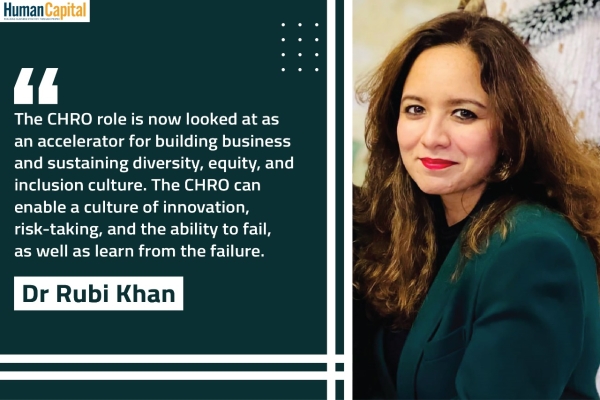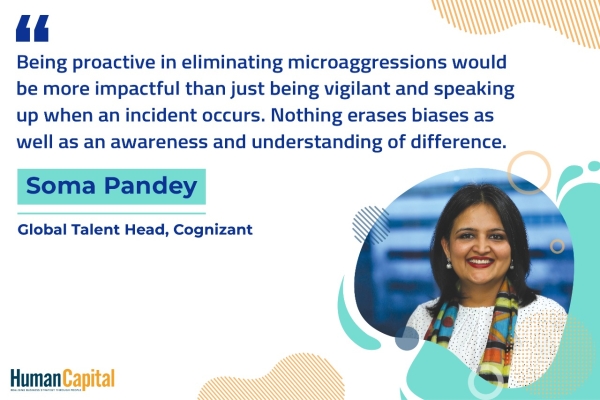It is unfair to both genders to believe that either gender is “better” or “worse” at a particular job – it is usually the person who either has or does not have the competence or skills…
Sumeet applied for a role as a Talent Acquisition Lead in an IT firm. While the resume listed the qualifications and experience which were ideal for the role, what impressed the selection panel was the specific achievements listed by Sumeet in managing large scale hiring for a project in a short period of time. The panel was very positive about Sumeet and were keen to do a quick interview so that they could make an immediate offer of employment. They felt Sumeet had all the skills for the role. At the personal interview, they discovered that Sumeet was a woman and felt very let down, not by her interview performance, but because they felt that being a woman, she would not be able to take the pressure demanded by the role.
One of the few things that really upset me is when people bring gender into the workplace to label individuals.
Women are
• Considered to be more focused, disciplined and goal-oriented
• Better at handling stress and pressure
• Better at multi-tasking and so on and so forth…
There are similar labels being attributed to our male counterparts. While it is true that women do have some significant traits, it is not true that all women have these traits. Similarly, all men do not have another set of traits. The truth lies somewhere in between. I believe that it is important that when we think of being a professional, we should think about what competencies are demanded of us in the workplace and try to work towards developing them. It is unfair to both genders to believe that either gender is “better” or “worse” at a particular job – it is usually the person who either has or does not have the competence or skills to do the job.
The newer companies, which have a much younger and vibrant workforce, have taken into consideration the various challenges faced by women and created solutions such as the introduction of flexi timings, extended maternity leave and drop and pick-up facilities. Today, they too have realised that men too need flexibility in the workplace, especially those who have a working spouse. Many have introduced reskilling and upskilling and other employee engagement initiatives, especially for women, to mentor them for leadership roles. Skill development facilitates high productivity, increased employment opportunities, and higher income. However, despite all the efforts put in by some of the organisations, the representation of women in the top leadership position is still minuscule. A diverse workforce not only strengthens productivity, creativity, employee engagement and profits, but also helps maintain the organisations’ reputation.
The issue in India is two-fold:
• A collective of socioeconomic mindsets that hold women back
• We as women discourage ourselves from doing what it takes to reach the highest level in the corporate ladder.
The first challenge to overcome is the mindset. The typical Indian household is a patriarchal system where, by default, the male members are considered superior to the female. Roles are allocated where any decisions pertaining to the family are automatically referred to the patriarch who takes all the decisions and compliance to these decisions is expected from the female members. This vision, even if not true in your home, is perpetuated constantly in the media and the social culture that surrounds you is something that women grow up with. Therefore, often they do not believe things can be different.
The 4 M Challenge
Most women face challenges which I categorise as the four M’s.
Marriage: The first challenge is Marriage. Many students I have interacted with and mentored in management schools worry less about the college exams and focus more on when and who they will get married to. They seriously worry if they will be “permitted” to work after marriage. They ponder on whether the prospective husband will be from a location where they can get a job, whether the in-laws will be difficult people and a myriad of other possible marriage-related challenges.
Maternity: The second challenge is Maternity. In India, women find it difficult to get the support to manage their children and work simultaneously. The guilt of keeping the child in a creche is not only felt by the mother, but also constantly reinforced by family and friends which results in so much self-doubt of continuing with a career.
Matriculation: The third challenge is Matriculation. Most women feel that their children will pass the final school matriculation exam only if they study with them and feed them healthy food at home. Wish that were true – children do not ace the exams with parental supervision, but it does make the mother feel less guilty if the results are not up to the mark!
Medical: The fourth challenge is Medical. With ageing parents and in-laws, there are regular medical problems where the elders need support. What women tend to do, is give up their careers at this stage, often after ten to fifteen years of having been in the workforce, to handle these situations. This results in them finding it difficult to rejoin after the crisis is over, and therefore, they opt out of a career.
The four M challenges make women opt out of careers at various stages, and hence, few survive to reach the CXO level. It is important for us to build a support system. Whether it is an online delivery service, domestic help options, caregivers or even people in the neighbourhood who can help us.
Break the glass ceiling
“Break the glass ceiling” is a phrase with which most women will be familiar. I think the glass ceiling all of us need to break is in our own head. Once we break that barrier, the sky is the limit. As we progress in our career, we learn from role models, both male and female, and get help from mentors and sponsors. It is not an easy journey, but it is fun – enjoy it! If we truly enjoy our jobs, and therefore, our career, we will make the best of the available options. When you do what you love, it shows, As Michael Jordon said “Just play. Have fun. Enjoy the game.”
I have found that there is never going to be the right moment to speak up, share a thought, or take a chance. Just seize the moment, if you allow your doubts to get in the way, the opportunity will pass you by. Do not let “perfect” get in the way of really, really, good. The worst is you will make a mistake. Then, own up, apologise, and move on. Appreciate the feedback, and act on it. If you are not making mistakes, you may not be doing something interesting. Handling failure is one of the best leadership lessons one can get.
As a woman leader, I have found that the best thing that one can do for women entering corporate India is to share your experience. Nobody has the perfect formula on how to manage work-life balance – neither men nor women. What works is how you can learn from another person’s experience, which sometimes, help solve your problems. Diversity task forces work well – a task force comprising both men and women who can share real-life examples, some tips and techniques and sometimes just be a sounding board works wonders. Remember, you are never too small to make a difference, make sure you make a difference, and it will count!

Do you look forward to permanently working from home after the pandemic subsides?
Trending
-
SBI General Insurance Launches Digital Health Campaign
-
CredR Rolls Out 'Life Happens' Leave For Its Employees
-
Meesho Announces 30-Week Gender-Neutral Parental Leave Policy
-
Microsoft Unveils Tech Resilience Curriculum To Foster An Inclusive Future
-
60% Indian Professionals Looking For Job Change Due To COVID: Survey
-
SpringPeople And Siemens Collaborate For Digital Transformation Push
-
86% Professionals Believe Hybrid Work Is Essential For Work Life Balance: Report
-
Almost 1 In Every 3 People's Personal Life Affected Due To Work Stress
-
Meesho Rolls Out Reset And Recharge Policy For Employees
-
80% Of Talent Leaders & Academics Say Pandemic Changed Skill Needs For Youth: Report
-
Hero Electric Rolls Out 'Hero Care' Program For Employees
-
Human Capital In Collaboration With ASSOCHAM Hosts Virtual Conference
-
IKEA India, Tata STRIVE Collaborate To Create Employability And Entrepreneurship Opportunities
-
SAP India, Microsoft Launch Tech Skilling Program for Young Women
-
DXC Technology, NASSCOM Collaborate For Employability Skills Program
-
Lenskart To Hire Over 2000 Employees Across India By 2022
-
Mindtree Launches Learn-and-Earn Program
-
Tata AIA Extends 'Raksha Ka Teeka' To Its Employees
-
Swadesh Behera Is The New CPO Of Titan
-
NetConnect Global Plans To Recruit 5000 Tech Professionals In India
-
Hubhopper Plans To Hire 60% Of Indian Podcasters By 2022
-
Corporate India Needs More Women In Leadership Roles: Report
-
Aon to Invest $30 Million and Create 10,000 Apprenticeships by 2030
-
Tech Mahindra Launches ‘Gift a Career’ Initiative for Upskilling of Youth
-
40% Women Prefer Flexible Working Options in Post-COVID World: Survey
-
3 out of 4 companies believe they can effectively hire employees virtually: Report
-
Vodafone , CGI and NASSCOM Foundation launch digital skills platform
-
Odisha: Bank, postal employees to deliver cash for elderly, differently-abled persons
-
Skill India launches AI-based digital platform for "Skilled Workforce"
-
Hiring activity declines 6.73% in first quarter: Survey
-
70% startups impacted by COVID-19 pandemic
-
Bajaj Allianz Life ropes in Santanu Banerjee as CHRO
-
Over 70 Percent MSMEs look at cutting jobs to sustain businesses
-
93 Per Cent employees stressed about returning to office post-lockdown
-
Johnson & Johnson India announces family benefits for same gender partners
-
Indian firms turning friendly towards working mothers
-
Welspun India names Rajendra Mehta as new CHRO
-
Wipro partners with NASSCOM to launch Future Skills platform



Human Capital is niche media organisation for HR and Corporate. Our aim is to create an outstanding user experience for all our clients, readers, employers and employees through inspiring, industry-leading content pieces in the form of case studies, analysis, expert reports, authored articles and blogs. We cover topics such as talent acquisition, learning and development, diversity and inclusion, leadership, compensation, recruitment and many more.
Subscribe Now












































Comment